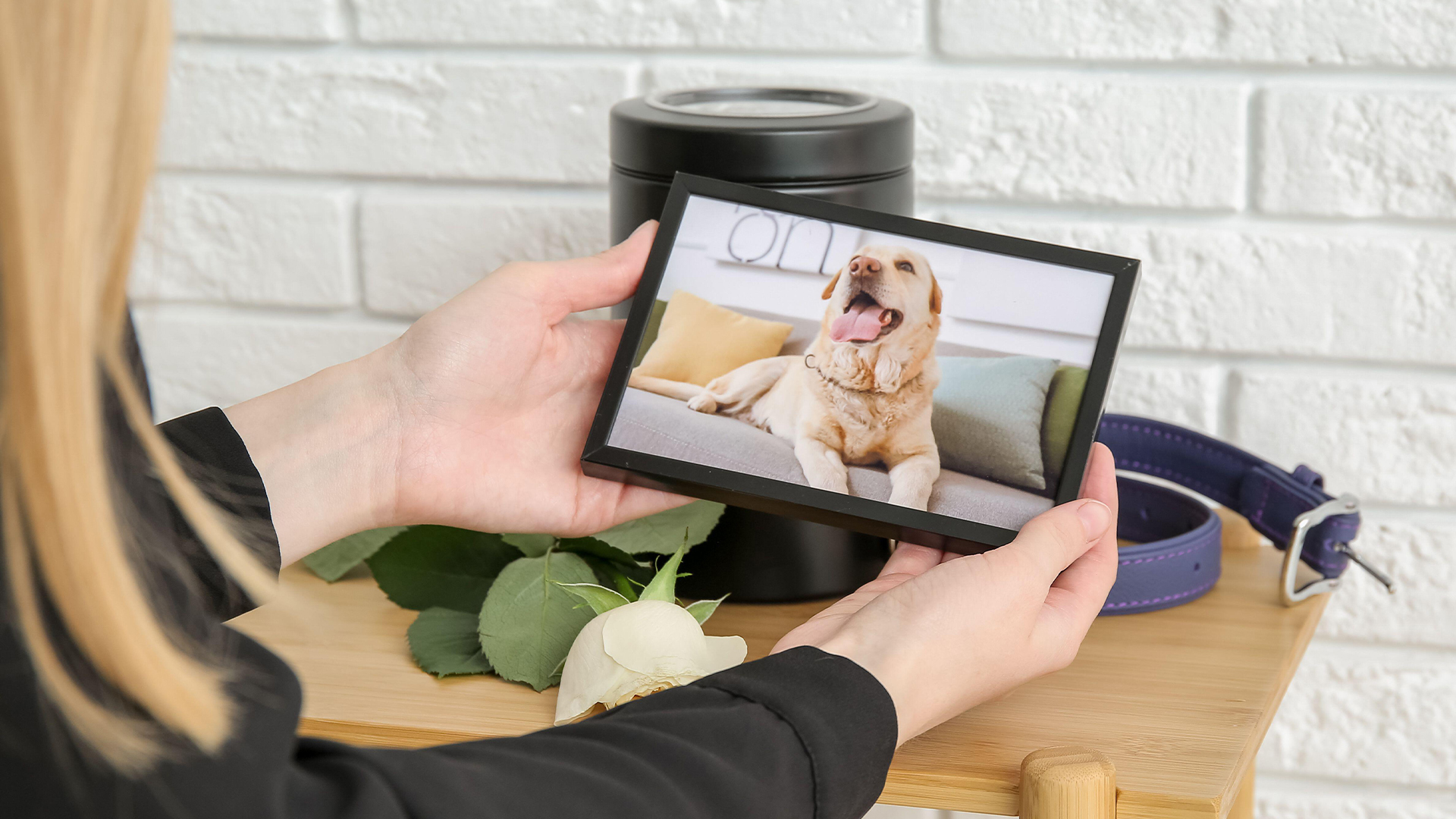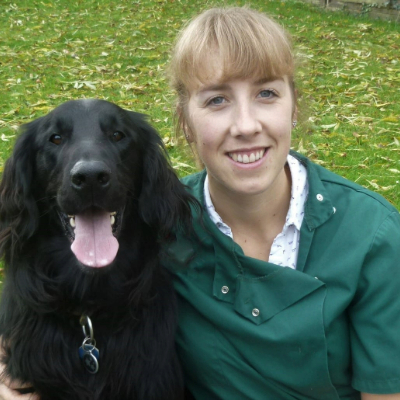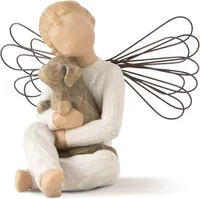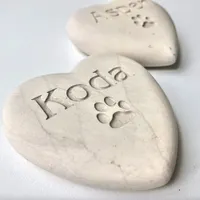How to cope with the loss of a pet (with tips from an expert)
If you’re struggling with how to cope with the loss of a pet, here’s what you need to know and where you can go for support

No one ever wants to think about losing their pet, but knowing how to cope with the loss of a pet can help when making those difficult goodbyes. Losing a pet can be a lonely and confusing time for owners and their families as they navigate this difficult process. We’re all pet owners at PetsRadar and we understand that this is a challenging time, and that everyone copes with the loss in a different way.
We’ve spoken to experts to help you through this experience, from knowing when it’s the right time to say goodbye to your pet, to helping your child cope with loss, and what support is out there if you’re struggling.
When is the right time to say goodbye?
When a pet becomes suddenly very poorly, sometimes euthanasia decisions are taken out of the owners’ hands. But in cases of elderly pets, or those animals dealing with long-term chronic illnesses and signs of aging, the decision to say goodbye can be less clear.
Dr Rebecca MacMillan MRCVS explains that most owners struggle when deciding whether the time is right to euthanize their pet.
“I always reassure owners that euthanasia prevents unnecessary suffering and is one of the greatest kindnesses we can offer our pets if their quality of life is deteriorating,” she says.
“In my experience, more owners have far more regrets about letting their pets linger on for too long than they ever do having them put to sleep ‘too early’. So, if you think your pet is struggling, as hard as it can be to let go, try and make the final decision with their best interests in mind. Speak to your vet if you are unsure what to do for your animal.”
Saying goodbye to your pet
Dr MacMillan MRCVS explains that having your pet down is an understandably emotional time.
Get the best advice, tips and top tech for your beloved Pets
“Vet practices recognize this and will help you as best they can. Each vet team will have their own way of working, but they will discuss the options with you and talk you through the process as they go. There is usually some time to speak to the vet before the actual euthanasia takes place and they will explain to you what will happen,” she says.
“It is probably best to say any extended goodbyes to your pet at home, as your vet may be limited on how much time they can give you during the appointment.”
The euthanasia process
Being with your pet during the euthanasia process is a very personal and individual decision. There is no wrong or right answer, and it is perfectly OK to say your goodbyes beforehand.
During the process, Dr MacMillan explains that some vets may take your pet to have an intravenous catheter placed in their leg, if their size allows.
“It is then up to you whether you want to stay with your pet while the actual euthanasia takes place or not. This is a very personal decision, and your vet won’t judge you either way,” she says.
“Your vet will administer a drug that acts like an overdose of anaesthetic. This will be carefully administered allowing your pet to slip away peacefully. The drug is not painful and acts fairly swiftly, leaving your animal feeling like they are going to sleep. After the euthanasia, your vet may be able to let you spend a few private minutes with your pet’s body to say your final goodbyes; however, don’t feel you have to do this if you would rather leave straight away.”
What happens next
If saying goodbye to your pet was planned in advance, for example with older animals, you might already have made arrangements to bury them somewhere that is special to you – or or arranged for a private pet cremation.
Your vet practice can help organise cremations, or you may take their body away to make your own arrangements. You might also like to consider if you want any keepsakes like fur clippings or paw prints, with many companies offering special ways to help owners remember their pets such as personalised memorial books, jewellery, and photo frames.
Willow Tree Angel Of Comfort | Amazon
This is a lovely gift for someone who is coping with the loss of a pet. It expresses sympathy, comfort, remembrance and healing.
This hand-cut heart-shaped stone can be personalized with the name of your pet.
What should you do if your other pets are mourning?
Many families have more than one pet in the household, and you might notice that the one who is left behind is grieving for their friend too.
“Some pets may mourn the loss of their household companion,” explains Dr MacMillan.
“You may notice they seem quiet, are off their food or they keep looking for their playmate. They may also pick up on the fact that you are upset too which can make them feel unsettled. Just try and keep your pet’s daily routine consistent to help them feel secure, offer them lots of positive attention, and get them checked by a vet if you are concerned.”
How to cope with the loss of a pet
Whether you’ve owned your pet for more than 10 years, or you had a shorter time together, there’s no denying the bond that is formed between pets and their owners. Losing a pet can be a traumatic life event, and can affect people differently. It’s important to take the time to grieve, and to know when to seek professional help.
A Blue Cross survey showed that nearly half of UK pet owners have felt they had to suffer in silence after losing a pet, with only 52% saying they would feel comfortable reaching out for support.
“We’re a nation of pet lovers but we often struggle to talk about our emotions when it involves the loss of a beloved pet – even with family and friends. It can be a distressing, confusing and lonely time,” says Diane James, head of pet loss support at Blue Cross.
Reaching out for support
Help is at hand for anyone who is struggling with how to cope with the loss of a pet.
US support
Animal Welfare Association: virtual and in-person sessions to help with pet bereavement. The sessions aim to help provide an environment for owners to share stories and celebrate your pet’s life with others who have experienced a similar loss.
Visit: awanj.org/community-outreach/pet-bereavement
_
The Association for Pet Loss and Bereavement: a tiered membership service, with guidance and support, chat rooms, and pet memorials. The bronze membership is free and includes access to a chat room and self-help tips.
Visit: aplb.org
UK services
Blue Cross Pet Loss Support: a free service that has been operating for 30 years helping owners through difficult goodbyes.
Telephone: 0800 096 6606
Email: plsmail@bluecross.org.uk
Webchat: bluecross.org.uk/pet-bereavement-and-pet-loss
Facebook: facebook.com/groups/bluecrosspetloss
_
Charity Cats Protection Paws to Listen: a grief support service for cat owners.
Telephone: 0800 024 9494
Helping children cope with the loss of a pet
A Blue Cross survey revealed more than 50% of parents that took part found it incredibly difficult to explain the loss of a pet to a child.
When helping your child deal with the loss of a pet, Blue Cross head of pet loss support Diane James recommends:
- Being honest about the circumstances – don’t pretend that their pet has ‘gone missing’ if, in fact, they have died.
- Include your child when discussing options or making decisions about the pet
- Don’t underestimate their feelings. Encourage them to talk about their pet and express their emotions; writing a story or poem or drawing a picture of their pet can be helpful.
- Try to understand the importance of the animal and what your child has lost, don’t trivialise or minimise their grief.
- Use language your child will understand – straightforward words such as “dead” or “died” are more appropriate than “put to sleep”, which may cause some confusion and anxiety for younger children.
- Don’t be afraid to share your own feelings of sadness.
Helping seniors cope with the loss of a pet
Losing a pet later in life can be especially traumatic, and Blue Cross says that the death of a pet can hit retired seniors even harder than younger adults, who may be able to seek support from friends or family, or distract themselves with work.
For some seniors their pet might have been their sole companion, and caring for them provided a sense of purpose and routine.
The charity recommends:
- A change to your daily routine can help – it’s a good idea to try to fill your time with activities you enjoy. Picking up a long-neglected hobby, taking a class, helping friends, rescue groups or animal charities to care for their animals can all help.
- Share your feelings with friends and family who understand how deep your loss feels. If you feel uncomfortable talking to friends, call our support line.
- Accept offers of help and support even if you don’t feel like talking to anyone. Friends, family and support volunteers will offer comfort and help you remember your pet fondly and process your grief.
- Adjusting to life without a pet can be hard especially if your pet provided a sense of purpose as well as companionship. Volunteering to help pets in need can be a good way to decide if and when you’re ready to become a pet owner again.
Read next about the sign of grief in pets

Rebecca is a vet surgeon who graduated in 2009 from the Royal Veterinary College in London. She has a wealth of experience in first opinion small animal practice, having done a mixture of day-to-day routine work, on-call emergency duties and managerial roles over the years. She enjoys medicine in particular and she is proud to have recently achieved a BSAVA postgraduate certificate in small animal medicine (with commendation). She writes on various feline and canine topics, including behavior, nutrition, and health. Outside of work and writing she enjoys walking her own dog, spending time with her young family and baking!

Becky Murray is a freelance writer and senior news writer at Horse&Hound. She is a very experienced pet owner and currently has two miniature Schnauzers (Rupert and Remi) two horses (Chloe and Ruby), a Welsh pony (Gilly) and two Shetland ponies (Mootie and Poppet).


